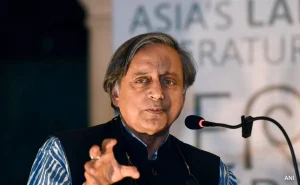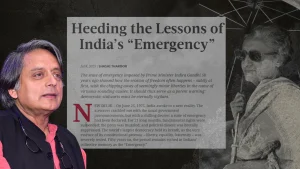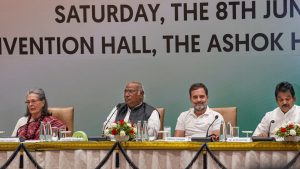Thiruvananthapuram- The ongoing dispute between Congress leaders has reached a new level of intensity as K Muraleedharan publicly declared that Shashi Tharoor would be excluded from all party programs in Thiruvananthapuram. The Congress On Shashi Tharoor controversy has exposed deep fractures within the party’s Kerala unit, with Muraleedharan stating categorically that the Thiruvananthapuram MP is no longer considered “one of us.”
Speaking to reporters on Sunday, Muraleedharan emphasized that the Congress On Shashi Tharoor situation has deteriorated to the point where formal exclusion from party activities is necessary. The senior leader made it clear that until Tharoor changes his stance on national security issues, he will remain persona non grata at Congress events in the state capital.
Tharoor’s Controversial “Nation First” Philosophy

The Congress On Shashi Tharoor debate intensified following the latter’s recent statements about prioritizing national interests over party loyalty. At a Kochi event on Saturday, Tharoor defended his position by asking a fundamental question about political allegiance. He argued that the nation should come first, with political parties serving merely as vehicles for national improvement.
Tharoor’s philosophy on the Congress On Shashi Tharoor relationship reflects his broader view that cooperation across party lines on national security matters should take precedence over partisan considerations. He acknowledged that many people have criticized him for supporting the armed forces and the central government regarding recent border developments, but maintained his resolve to stand firm on what he believes serves the country’s best interests.
Party Leadership’s Dilemma Over Tharoor’s Position

The Congress On Shashi Tharoor controversy has placed the party’s national leadership in a difficult position. Muraleedharan indicated that the central leadership would ultimately decide what disciplinary action, if any, should be taken against the Congress Working Committee member. This development suggests that the Congress On Shashi Tharoor issue has transcended state-level politics and now requires intervention from the party’s highest echelons.
The complexity of the Congress On Shashi Tharoor situation is further compounded by Tharoor’s membership in the Congress Working Committee, which gives him significant standing within the party hierarchy. His dual role as both a prominent MP and a CWC member makes any disciplinary action more politically sensitive and potentially damaging to the party’s image.
Historical Context of the Ongoing Rift
The current Congress On Shashi Tharoor controversy didn’t emerge in isolation but represents the culmination of several previous disagreements. Muraleedharan had earlier criticized Tharoor for sharing survey results that suggested he was the UDF’s preferred choice for Chief Minister, questioning his party loyalty and suggesting he should “decide which party he belongs to.”
The Congress On Shashi Tharoor tension also stems from Tharoor’s reactions following the Pahalgam terror attack, which drew sharp criticism from within the Congress ranks. Some party members felt his comments put the organization on the defensive and undermined the party’s official position on national security matters.
Emergency Article Adds Fuel to Fire


Another dimension of the Congress On Shashi Tharoor conflict involves his controversial article criticizing former Prime Minister Indira Gandhi over the Emergency period. Published in a regional daily, this piece further strained his relationship with party colleagues who viewed it as an inappropriate attack on one of Congress’s most revered leaders.
Muraleedharan’s response to the Congress On Shashi Tharoor Emergency article controversy was swift and pointed. He urged the CWC member to choose a clear political path if he felt constrained within the Congress framework, essentially questioning whether Tharoor’s ideological alignment matched the party’s core values and historical positions.
Impact on Congress Unity and Future Prospects


The Congress On Shashi Tharoor dispute highlights broader challenges facing the party in maintaining ideological cohesion while accommodating diverse viewpoints. Tharoor’s emphasis on cross-party cooperation on national security issues conflicts with the traditional opposition role expected from Congress members, creating a fundamental tension about the party’s strategic direction.
The Congress On Shashi Tharoor controversy also raises questions about internal democracy within the party and how dissenting voices are handled. While Tharoor argues that his position serves the national interest, party leaders view it as undermining collective decision-making and party discipline.
Conclusion: A Test for Congress’s Internal Governance
The escalating Congress On Shashi Tharoor controversy represents more than a personal dispute between two leaders; it embodies the broader challenges facing Indian political parties in balancing individual conscience with collective responsibility. As the party’s national leadership weighs its response, the resolution of this conflict will likely set important precedents for how the Congress handles internal dissent and maintains party unity while respecting diverse perspectives within its ranks.

